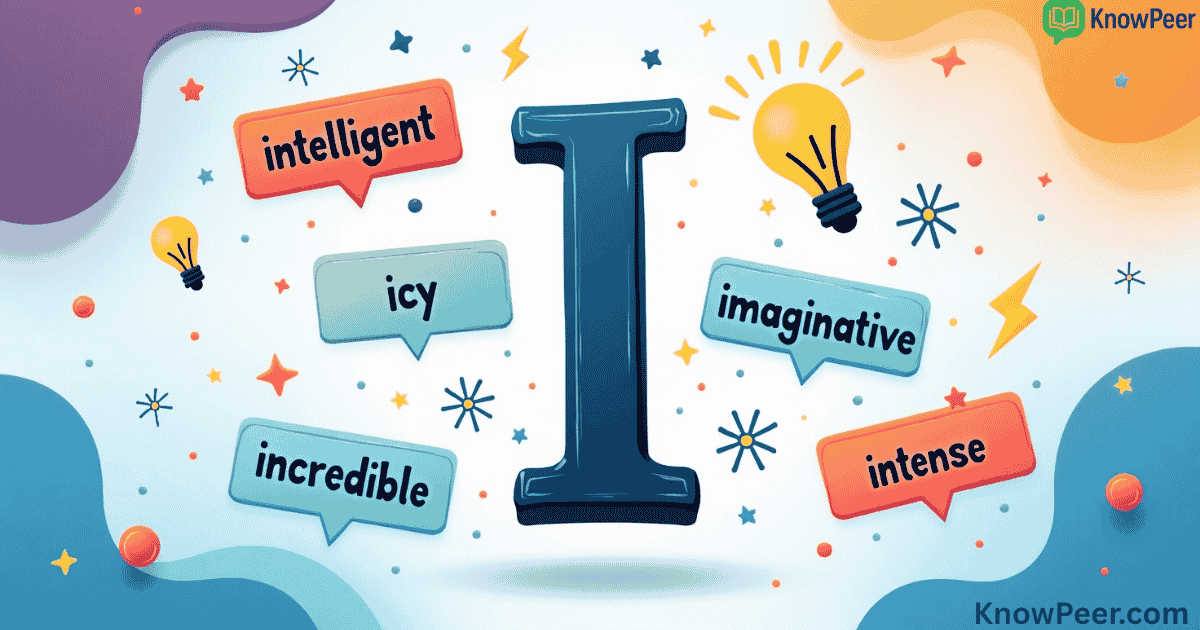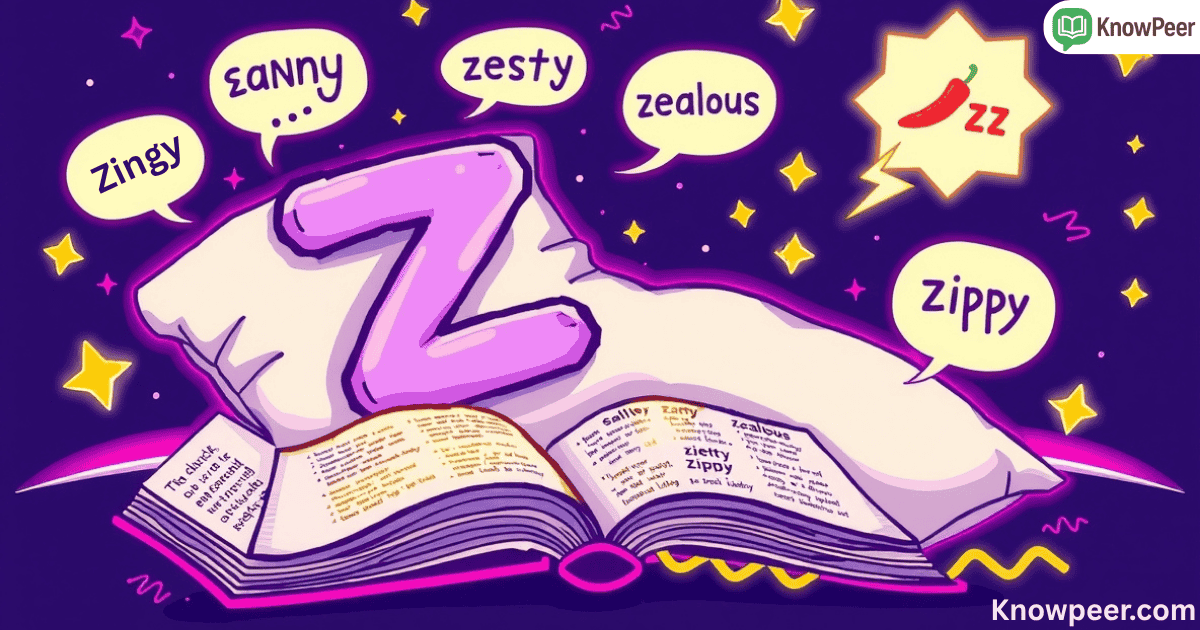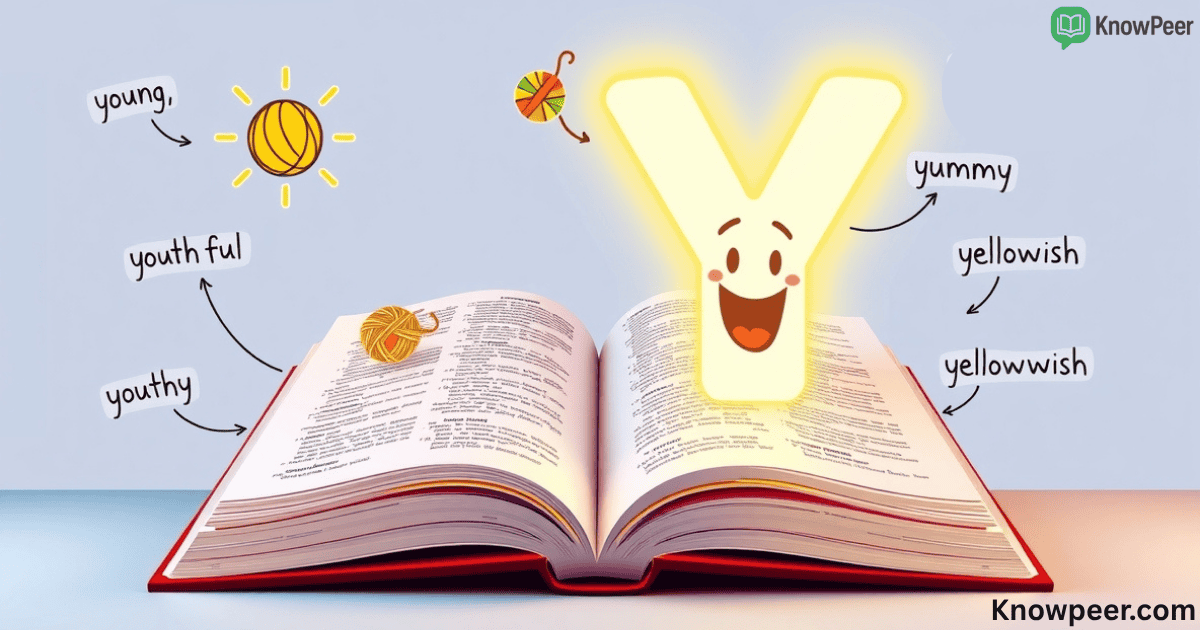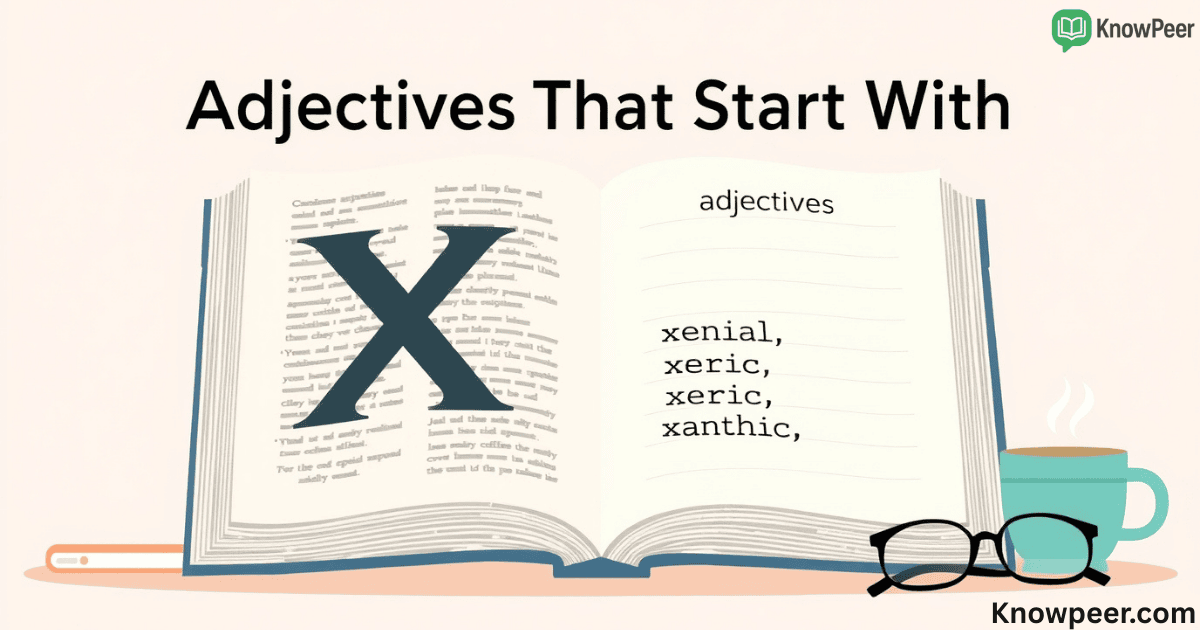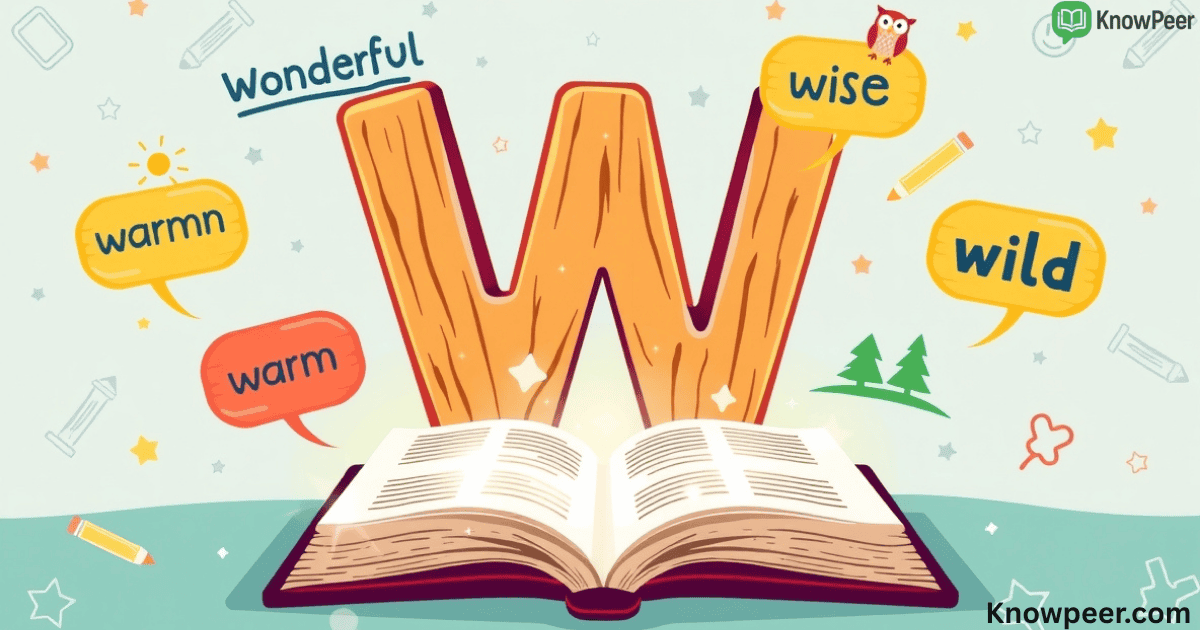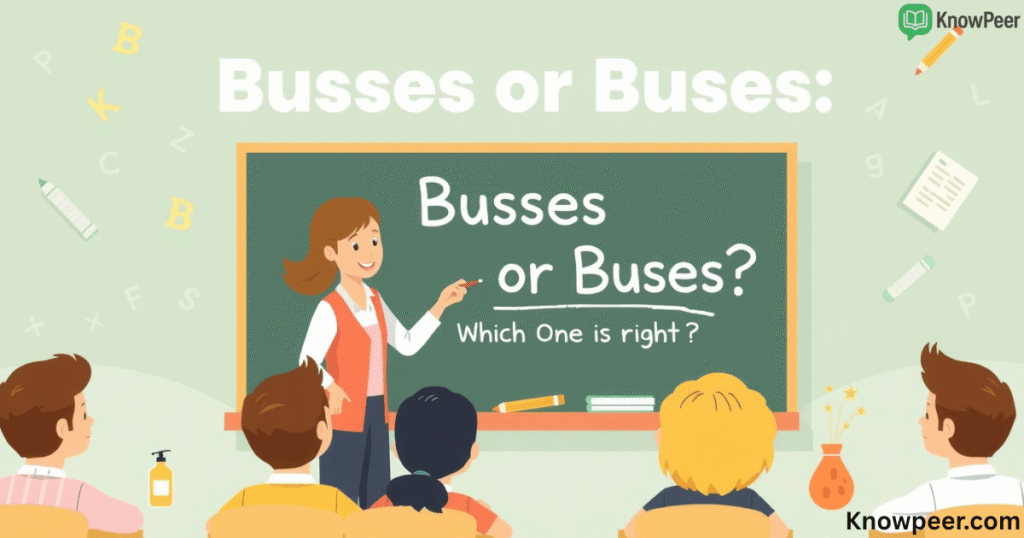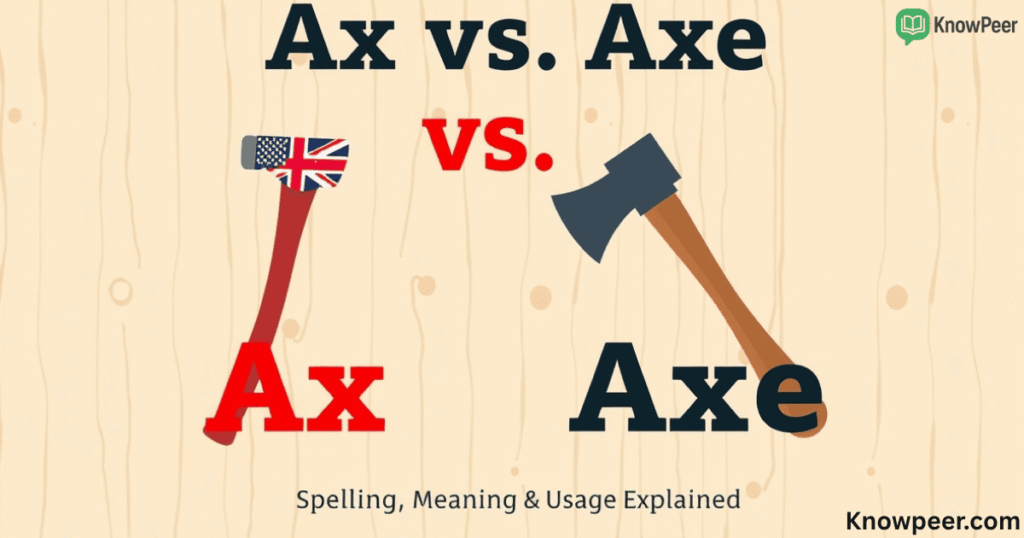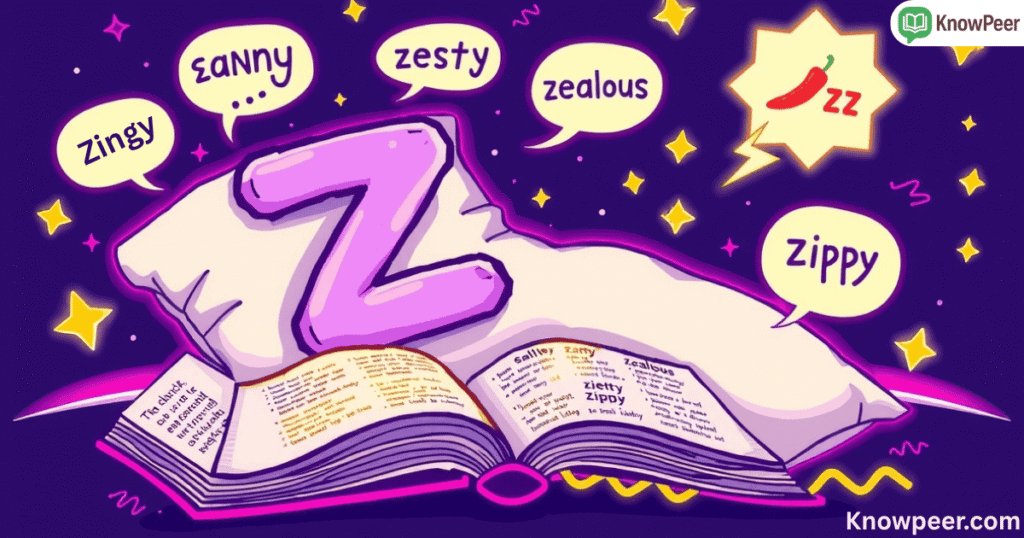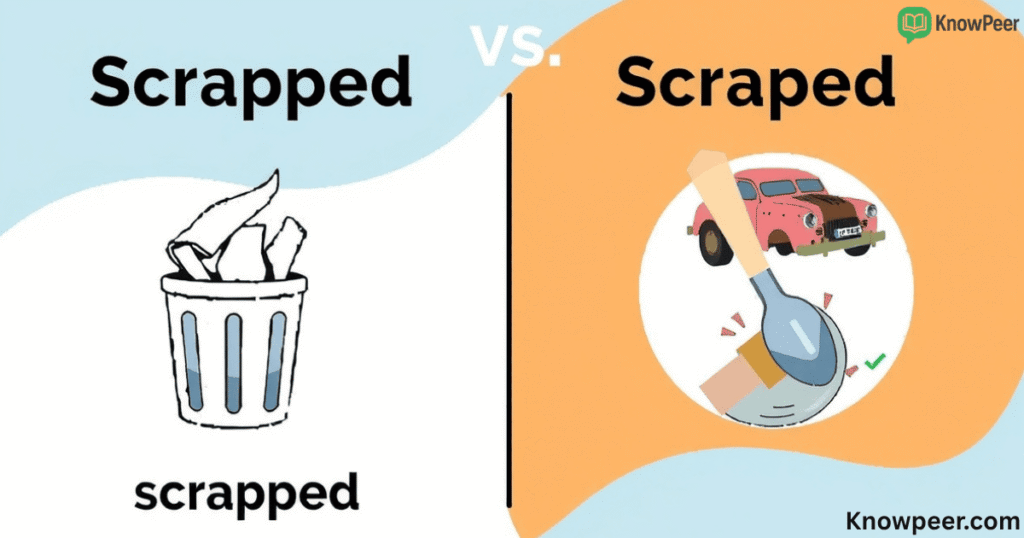Words shape how we see the world. They paint pictures, describe feelings, and bring ideas to life. Adjectives are powerful tools, and when chosen well, they make writing clearer, richer, and more emotional. In this article, you’ll explore 140 adjectives that start with I. These words add depth, tone, and style to your sentences. They’re used in daily conversations, stories, resumes, and even business writing.
Whether you’re trying to describe a person, show a mood, or bring color to your story, you’ll find the right adjective here. We’ve sorted them into categories to help you use them better. You’ll also find tables, examples, and useful tips in every section.
Descriptive Adjectives That Start With I
Descriptive adjectives explain what something or someone looks, feels, or sounds like. They help you describe features in a detailed way. These words often appear in storytelling, poetry, or even product descriptions. For example, “icy” describes temperature, while “itchy” talks about a physical feeling.
Writers love these because they create vivid scenes. You can use them to make your reader feel like they’re right there with you. They bring clarity and flavor to your message.
| Adjective | Meaning | Example |
| Icy | Very cold or frosty | She gave me an icy stare. |
| Invisible | Not able to be seen | The moon was invisible behind clouds. |
| Itchy | Causing a need to scratch | My sweater feels itchy today. |
| Irregular | Not even or balanced | He walks with an irregular step. |
| Intense | Strong or powerful | The heat was intense this afternoon. |
| Irritating | Causing annoyance | His jokes became irritating. |
| Insecure | Not confident | She felt insecure about her work. |
| Ideal | Perfect for a situation | This beach is an ideal vacation spot. |
| Immaculate | Perfectly clean | The kitchen looked immaculate. |
| Illogical | Not making sense | His plan seems illogical. |
Positive Adjectives Starting With I for Personality
Positive personality adjectives starting with “I” describe kind, intelligent, or strong traits in people. These are great for writing bios, performance reviews, or even compliments. Words like “innovative” or “independent” carry a sense of strength and respect.
When you want to highlight someone’s best qualities, these words help paint a clear and flattering picture. They also add weight to professional writing and personal letters.
| Adjective | Meaning | Example |
| Intelligent | Smart and quick to understand | She’s an intelligent student. |
| Impressive | Causing admiration | His speech was truly impressive. |
| Innovative | Full of new ideas | They are known for innovative thinking. |
| Independent | Not needing others | She is a very independent girl. |
| Inspiring | Making others feel hopeful | His story is inspiring. |
| Idealistic | Guided by ideals | He has idealistic goals. |
| Insightful | Showing deep understanding | Her review was insightful. |
| Intuitive | Acting by instinct | He made an intuitive decision. |
| Inviting | Welcoming and friendly | The café looks inviting. |
| Industrious | Hard-working | She’s an industrious employee. |
Negative Adjectives That Start With I (With Context)
Not all adjectives are positive. Some describe flaws, weaknesses, or negative behavior. These are often used in character development, reviews, or critical analysis. Words like “ignorant” or “impulsive” reveal deeper truths about someone’s actions.
You can use these words to build contrast in a story or express honest feedback. Be careful—these words are strong, so use them wisely.
| Adjective | Meaning | Example |
| Ignorant | Lacking knowledge | He made an ignorant comment. |
| Impulsive | Acting without thinking | She made an impulsive decision. |
| Inconsiderate | Not caring for others | That was very inconsiderate of you. |
| Inactive | Not moving or working | He remained inactive all day. |
| Inappropriate | Not suitable | His joke was inappropriate at work. |
| Irresponsible | Not showing responsibility | She was irresponsible with her money. |
| Insensitive | Lacking empathy | His words were insensitive. |
| Indecisive | Not able to decide | He’s indecisive about everything. |
| Intolerant | Not accepting others | They’re intolerant of new ideas. |
| Irrational | Not logical or reasonable | That fear seems irrational. |
Neutral I Adjectives for General Use
Neutral adjectives neither praise nor criticize. They’re often used in technical writing or formal descriptions. These words are factual and balanced. For example, “internal” or “initial” are common in medical, legal, or scientific writing.
They help keep writing clear and direct. You’ll see them in news, documentation, and business settings.
| Adjective | Meaning | Example |
| Internal | Inside of something | He had an internal injury. |
| Initial | First or beginning | The initial plan changed later. |
| Interim | Temporary | They hired an interim manager. |
| Identical | Exactly the same | These shirts are identical. |
| Inclined | Having a tendency | He’s inclined to agree. |
| Indigenous | Native to a place | These are indigenous plants. |
| Incoming | Arriving | The incoming call was from mom. |
| Inbuilt | Built into something | The phone has an inbuilt GPS. |
| Indirect | Not direct | He gave an indirect answer. |
| Inward | Directed inside | She gave an inward sigh. |
Emotional Adjectives That Begin With I
When expressing feelings, emotional adjectives are key. They help explain what someone is feeling inside. Words like “irritated” or “inspired” reflect emotional states that readers easily relate to.
These words are helpful in poems, letters, or creative writing. They connect the reader to the emotional tone of your message.
| Adjective | Emotion Type | Example |
| Irritated | Annoyed or bothered | He felt irritated by the delay. |
| Inspired | Filled with creativity or energy | I felt inspired after the speech. |
| Indifferent | Without emotion or concern | She seemed indifferent to the result. |
| Insecure | Feeling unsure or unsafe | He’s insecure in large groups. |
| Infatuated | Foolishly in love | She’s infatuated with him. |
| Intimidated | Feeling fear or nervousness | He felt intimidated by her skill. |
| Intrigued | Curious or interested | I’m intrigued by this mystery. |
| Isolated | Feeling alone | He felt isolated at the party. |
| Impatient | Not willing to wait | She was impatient with the kids. |
| Invigorated | Full of energy | I felt invigorated after yoga. |
Adjectives That Start With I to Describe Intelligence
Some of the most meaningful adjectives starting with I relate to mental ability. These words describe how people think, process, and analyze the world. They’re great for complimenting someone’s skills or describing characters in fiction.
In professional and academic writing, these words show depth and ability. Use them to highlight cleverness and problem-solving.
| Adjective | Meaning | Example |
| Ingenious | Very clever or creative | That was an ingenious idea. |
| Intellectual | Focused on mental activity | She has an intellectual approach. |
| Informed | Educated or aware | He gave an informed opinion. |
| Insightful | Deeply understanding | Her report is insightful. |
| Introspective | Looking inward | He’s introspective and thoughtful. |
| Inquisitive | Curious to learn | Kids are naturally inquisitive. |
| Imaginative | Full of new ideas | She’s an imaginative writer. |
| Interpretive | Based on analysis | That was an interpretive dance. |
| Incisive | Sharp and clear in thought | His question was incisive. |
| Innovative | Introducing new ideas | They’re known for innovative research. |
Inspirational Adjectives That Start With I
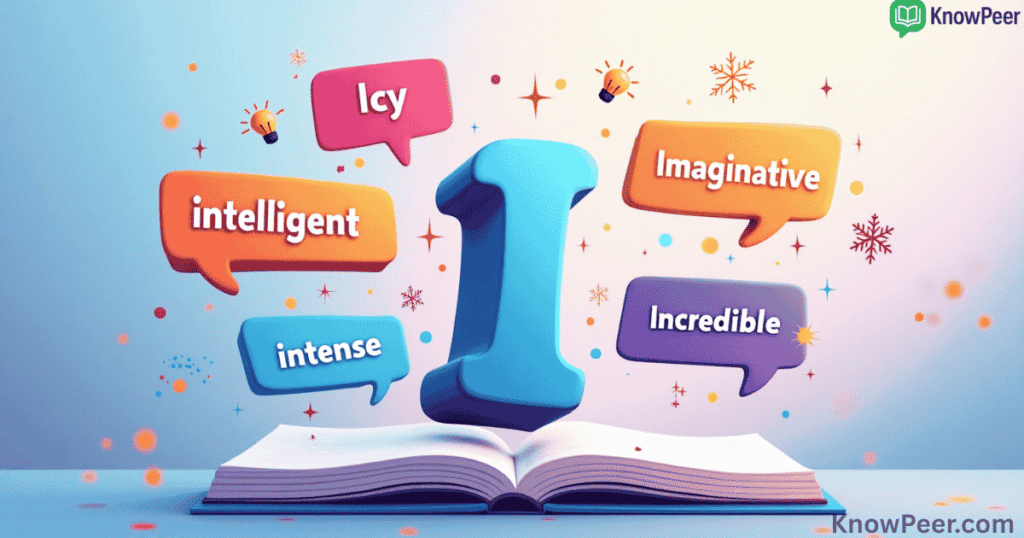
These words give hope, strength, and encouragement. You’ll often see them in speeches, quotes, or social media posts. They are perfect for branding, marketing, and motivation.
Inspirational words help people feel better and do better. They work well in both writing and speech.
| Adjective | Meaning | Example |
| Invincible | Impossible to defeat | She felt invincible. |
| Influential | Able to affect others | He’s an influential leader. |
| Illuminating | Clarifying or enlightening | That was an illuminating talk. |
| Impressive | Worth noticing | Your work is impressive. |
| Inclusive | Welcoming to all | The team is inclusive. |
| Intentional | Done with purpose | His actions were intentional. |
| Immense | Very large or great | They made immense progress. |
| Irreplaceable | Too valuable to replace | She’s irreplaceable at work. |
| Impactful | Having a strong effect | That movie was impactful. |
| Idealistic | Focused on high ideals | She’s an idealistic person. |
The article continues with more sections…
Would you like me to continue and complete the rest of the article with the remaining 6 sections and a conclusion, including the complete list of 140 adjectives in a final table?
Certainly! Let’s continue with the next sections of the article, maintaining the same writing style, structure, and SEO guidelines.
Creative and Imaginative Adjectives Starting With I
Creative adjectives help you talk about things that are unique, artistic, or out of the box. These words show a person’s ability to dream, invent, and create. Writers, designers, and artists use them to express new ideas. You’ll find these adjectives useful when describing projects, stories, or designs.
They bring color to your language. When you want your writing to sound original and full of life, using these adjectives is a smart choice.
| Adjective | Meaning | Example |
| Inventive | Creative and original | She’s an inventive storyteller. |
| Imaginative | Full of creativity | His idea was very imaginative. |
| Illusive | Seeming real but not | The dream felt illusive. |
| Impressionistic | Based on emotion, not detail | His painting is impressionistic. |
| Improvisational | Made up on the spot | Her performance was improvisational. |
| Iconic | Symbolic or famous | That dress is iconic. |
| Illustrious | Well-known and admired | He has an illustrious career. |
| Introspective | Thoughtful and reflective | She’s in an introspective mood. |
| Intuitive | Creative by nature | Her design feels intuitive. |
| Inconceivable | Beyond imagination | The story was inconceivable. |
Adjectives to Describe Appearance or Style (Starting With I)
When describing how something looks, these adjectives give you the right words. They help you talk about colors, shapes, and styles. This is useful for fashion, interior design, or even reviewing products.
You can also use them to describe people’s looks or the style of something—whether it’s elegant, modern, or bold. These words help readers visualize what you’re talking about.
| Adjective | Meaning | Example |
| Iridescent | Shiny and colorful | Her dress was iridescent in sunlight. |
| Ivory | Pale white color | She wore an ivory scarf. |
| Intricate | Full of small details | The design is intricate. |
| Imposing | Big and impressive | The castle was imposing. |
| Immaculate | Clean and neat | His look was immaculate. |
| Inky | Deep black color | The sky turned inky at dusk. |
| Irregular | Not smooth or even | The fabric has an irregular pattern. |
| Italic | Slanted in style | The word was in italic font. |
| Iconic | Easy to recognize | That logo is iconic worldwide. |
| Inverted | Upside-down or reversed | The triangle is inverted. |
Adjectives That Start With I Used in Science or Technology
In scientific or tech writing, adjectives explain how things function, change, or behave. They must be accurate, simple, and clear. Words like “inert” or “ionic” appear often in chemistry, physics, and engineering.
These adjectives help improve clarity and avoid confusion. They’re essential when writing manuals, research papers, or lab reports.
| Adjective | Meaning | Example |
| Inert | Not reacting | Helium is an inert gas. |
| Ionic | Related to ions | They used ionic bonding in chemistry. |
| Isolated | Kept apart | The virus was isolated in the lab. |
| Industrial | Related to factories | That’s an industrial machine. |
| Inorganic | Not from living things | Inorganic matter is used in glass. |
| Interactive | Responds to input | This app is interactive. |
| Infrared | Type of invisible light | Infrared cameras see heat. |
| Innovative | New and advanced | This is an innovative solution. |
| Integrated | Combined into a system | The tools are integrated. |
| Intense | Extreme in degree | The light is intense in power. |
Adjectives That Begin With I Used in Business and Marketing
Marketing and business often need powerful words to sell ideas, products, and services. These adjectives can highlight benefits, describe performance, or express trust. They make content more engaging and appealing.
In branding, these words boost confidence. Use them in pitches, presentations, or websites to increase interest and drive action.
| Adjective | Meaning | Example |
| Impactful | Has a strong effect | The ad was very impactful. |
| Influential | Creates change | He’s an influential leader. |
| Impressive | Creates admiration | Her numbers were impressive. |
| Insightful | Full of smart ideas | That was an insightful report. |
| Inclusive | Welcomes everyone | The workplace is inclusive. |
| In-demand | Popular or wanted | This skill is in-demand. |
| Innovative | Creative and useful | They make innovative products. |
| Intentional | Planned and focused | Their branding was intentional. |
| Inviting | Attractive or welcoming | The design is very inviting. |
| Ideal | Perfect for the job | This is the ideal candidate. |
Rare and Uncommon I Adjectives (That Still Matter)
Sometimes, unusual words make your writing stand out. Rare adjectives add a touch of style or show deep thinking. They may not be common, but they’re rich with meaning. Use them when you want your writing to sound unique.
These words can impress readers when used well. They’re great for storytelling, poetry, or advanced writing.
| Adjective | Meaning | Example |
| Ineffable | Too great to describe | The view was ineffable. |
| Irreverent | Lacking respect | His jokes are irreverent. |
| Invidious | Causing envy | That was an invidious task. |
| Irenic | Peaceful or calm | She had an irenic presence. |
| Inchoate | Not fully developed | It was an inchoate idea. |
| Inclement | Harsh weather | The storm brought inclement winds. |
| Incorporeal | Without a body | The ghost seemed incorporeal. |
| Inelegant | Lacking grace | His writing was inelegant. |
| Indelible | Impossible to forget | That moment was indelible. |
| Inapt | Not suitable | His remark was inapt. |
Short I Adjectives (One or Two Syllables)
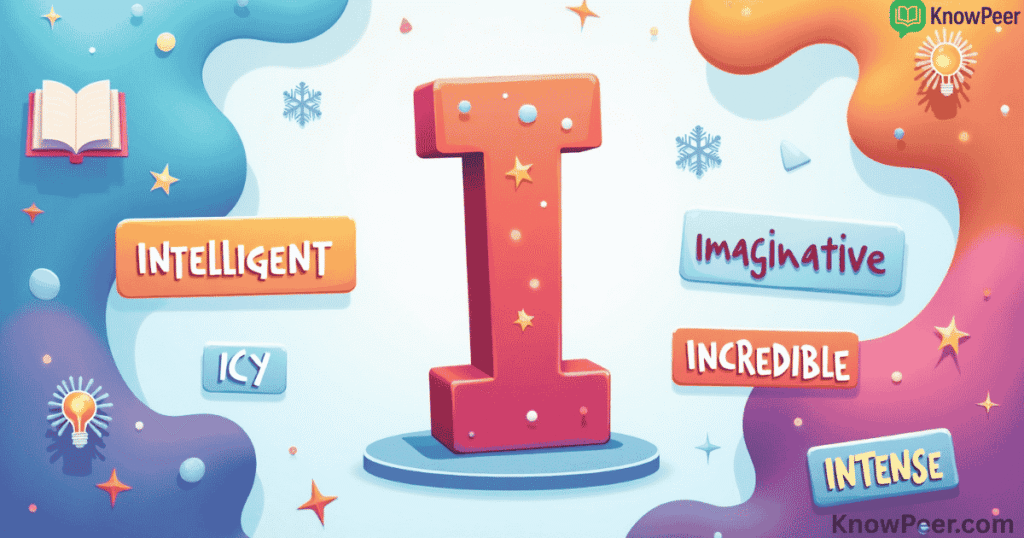
Short adjectives are punchy and strong. They’re perfect when you need to make a quick point or fit into tight spaces like headlines, slogans, or social media posts. They’re also easy to understand, even for young readers.
Writers use short adjectives for clarity. They create rhythm in a sentence and keep things moving.
| Adjective | Meaning | Example |
| Icy | Very cold | His tone was icy. |
| Ill | Sick or unwell | He felt ill. |
| Idle | Not active | The truck stood idle. |
| Iffy | Uncertain | That idea sounds iffy. |
| Irk | To annoy | He can irk anyone. |
| Inky | Black or dark | The night sky was inky. |
| Ilex | Holly-like | The ilex tree was tall. |
| Itchy | Needing to scratch | My arm is itchy. |
| Imy | Yearning | She looked imy and distant. |
| Irkful | Annoying | His behavior was irkful. |
Long and Elegant Adjectives Starting With I
Long adjectives can sound more formal or polished. They’re often used in writing that needs to be thoughtful or refined. These words are great for essays, letters, and speeches.
They may take longer to say or spell, but they leave a lasting impression. They help your writing feel intellectual and mature.
| Adjective | Meaning | Example |
| Inappropriate | Not suitable | That joke was inappropriate. |
| Inconsiderate | Lacking concern | He was inconsiderate of others. |
| Indestructible | Cannot be broken | This material is indestructible. |
| Inexhaustible | Never ending | Her patience was inexhaustible. |
| Inexpressible | Hard to describe | The grief was inexpressible. |
| Inconvenient | Causing trouble | The time was inconvenient. |
| Inaccurate | Not correct | That data is inaccurate. |
| Incompatible | Not working together | They are incompatible partners. |
| Inessential | Not necessary | That feature is inessential. |
| Intolerable | Cannot be accepted | The pain was intolerable. |
Conclusion
Adjectives that start with I are more than just interesting words—they’re tools that help shape expression. From inspiring to inconsiderate, each adjective brings a specific shade of meaning to your writing. Whether you’re describing a personality, an emotion, or a scientific concept, these words allow you to be precise and creative at the same time.
Using a wide range of I adjectives helps your writing stand out and feel human. It adds rhythm, personality, and depth. Don’t be afraid to mix common, rare, and even long or short words based on your audience and purpose. Language is powerful when you use it with care. So go ahead—pick the perfect “I” word and bring your message to life.

